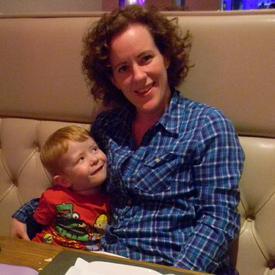We are pleased to announce that as of March 4, 2025, an updated Rich Text Editor has been introduced in the MyFitnessPal Community. To learn more about the changes, please click here. We look forward to sharing this new feature with you!
Help! Gaining on Maintenence Calories
Replies
-
How I gained on maintenance calories was to have one high calorie day above maintenance. I dont know if I could otherwise.0
-
After upping your calories to maintenance, you can expect to gain glycogen and water, which can be up to around 5lb, sometimes more. After this stops, the weight should be stable. This can even happen when switching from a big deficit to a smaller one, i.e. the weight stabilises after the glycogen stores are replenished, then you carry on losing weight at a slower rate.
You need to wait a few weeks to see if your weight is consistently going up, or if it's water weight gains etc. If you're slowly gaining over a period of weeks, then you're not eating maintenance calories, you're above maintenance. If your weight goes up for a bit then stabilises, you're at maintenance. If your weight goes up for a bit, then starts slowly going down again, you're still at a deficit.0 -
"1350 calories can't possibly be maintenance. The PT is an idiot."
For a 63 year old woman, yea it can. Scooby's calculator for exercising 3x a week assumes a level of intensity that a young to middle aged person can put forth. As people age, they can't exercise as vigorously and daily energy requirements decrease. I ran the scooby calculator and came up with 1867 cal/day for 'light exercise 1-3x/week' because if you want to call what a 63 year old is physically capable of anything more than light exercise you're way off.
Also, the PT probably wanted OP to slowly up the eating instead of just binging for a week and undoing all the progress that she made. Speaking of which...OP, are you tracking food the same way as before you started eating more? Are you sure you aren't slipping/relaxing/not counting snacks now that you've 'made it?'
"It could be glycogen/waterweight."
Not 6 lbs worth for a 160 lb female. At that weight, you're talking about a pound or two. She gained 6. Something else is contributing to the weight gain.0 -
"It could be glycogen/waterweight."
Not 6 lbs worth for a 160 lb female. At that weight, you're talking about a pound or two. She gained 6. Something else is contributing to the weight gain.
I'm a 140lb female and my glycogen/water weight changes have been as much as 5-6lb. I lost this much in 2 days of no food (due to illness), followed by regaining it over a period or 3-4 days.0 -
Erm... am I the only one thinking that if your measurements have stayed the same you are, in fact, doing an excellent job of maintaining, despite what the stupid and deceptive scales are saying? You've done a brilliant job, continue what you're doing, maybe try eating a bit more, and as long as you're happy with the tape measure tell the scales to get lost! :drinker:0
-
Did she say that she was sick and ate nothing for two days?"It could be glycogen/waterweight."
Not 6 lbs worth for a 160 lb female. At that weight, you're talking about a pound or two. She gained 6. Something else is contributing to the weight gain.
I'm a 140lb female and my glycogen/water weight changes have been as much as 5-6lb. I lost this much in 2 days of no food (due to illness), followed by regaining it over a period or 3-4 days.0 -
I agree that 1350 cals to maintain could actually be correct and not too low. When I was at my goal weight of 140, I had to eat 1200-1400 a day and do tons and tons of cardio to maintain. No lie. I was very precise. If I went over 1500 a day. the scale would creep up. I then got injured (stress fracture) and laid off the exericse but stuck to 1200 cals a day religiously. I maintained my weight. You'd think I would have lost on that, but I didn't.
But the main thing here is the quitting smoking. I read that it can slow your metabolism by 10%. So, assume that is what it is. Take the 6 pound gain--or even 10 pounds, until your body adjusts -- and then see if you can coax it off slowly. But at age 63 for a female, I am afraid 1350 cals might be the sweet spot for maintenance.0 -
Your training put you on a too low calorie diet. Meaning now, when you up your calorie intake, you will gain weight because you were starving yourself before.0
-
I agree that 1350 cals to maintain could actually be correct and not too low. When I was at my goal weight of 140, I had to eat 1200-1400 a day and do tons and tons of cardio to maintain. No lie. I was very precise. If I went over 1500 a day. the scale would creep up. I then got injured (stress fracture) and laid off the exericse but stuck to 1200 cals a day religiously. I maintained my weight. You'd think I would have lost on that, but I didn't.
You must be quite tiny!0 -
I'd address the quitting of smoking, when you smoke your heart rate is accelerated from the nicotine , which can burn calories , when you quit you don't have that faster heart rate thing going on anymore. Just my opinion.. Hang in there keep doing what your doing add in more weightlifting, add more muscle...goodluck
This is false. A non smoker will be able to push themselves longer which will in turn burn more calories. A smokers heart rate may be higher at a random speed/pace but will be short lived and the smoker will tire long before a non smoker. I was a smoker for 15 years before I quit 6 years ago and i can you from experience that my cardio was nowhere near what my cardio is now 6 years later.0 -
sigh.
I think you mean 300 grams, not 300 mg--which would be miniscule.
Each gr of glycogen binds to water (I've seen different numbers, from 2.5 to 4--and no I'm not going to go look up some "real science" for you, some things are well enough known. If you don't know it, then you can look it up and educate yourself.). Either way, even if it's only 2, then 300glycogen + 600 water is nearly 1 kilo, or 2 lbs. This is the big whoosh people get when they cut. This is very well known.
No, no one is making this up or trying to sell anything. Just the opposite.
I don't think we need to talk about this any longer. I don't feel fair debating you.0 -
1) 1200 is too low
2) read http://www.myfitnesspal.com/topics/show/1071202-why-you-gain-weight-if-you-eat-more-than-your-cut0 -
I just calculated my BMR and TDEE etc. in Scooby, and for my height, age, and activity level, it says I need to net
1170 - to lose (20% calorie reduction)
and
1463 - to maintain.
I have also independently calculated my caloric needs by a formula in an exercise book, on a couple of medical websites, and the numbers are similar.
Small numbers (even below 1200), are recommended and correct for some people.0 -
I USED to maintain on less than 1000 calories after 12 years of eating disorders.
I now maintain on about 1700. Your body adjusts.
Just under 5'4" - 23 y/o - female - 140.5lb.0 -
OK. So, I've lost over 100 pounds . I did it by changing my outlook on food and exercise and lifestyle. I reached my goal in 14 months. Then I upped my caloric intake from 1200 to 1350 on the advice of the trainer at the gym to maintain.
I am working out hard 3 times a week and I was swimming the other 3 days. I had to drop the swimming due to the weather about two weeks ago.
I quit smoking two months ago. I have made it a point not to snack or eat more.
I have gained 6 pounds. I can't seem to lose it. Any advice would be more than welcome. Especially since I leave for vacation in 3 days!
First thing that happens when you stop a cut is that your body replenishes its glycogen stores. In a deficit your muscles don't maintain as much glycogen. If I wanted to cut down to 180 for instance, I'd actually want to cut to about 175, because I would pick up about five pounds of water weight in my muscles once I got to maintenance.
I wouldn't really sweat it, unless you really need to hit a certain scale number.
Rigger0 -
Well, that's good news, I guess if I'm not losing glycogen+water, then I must be losing 3lbs of fat everyday. Yay me!0
-
sigh.
I think you mean 300 grams, not 300 mg--which would be miniscule.
Each gr of glycogen binds to water (I've seen different numbers, from 2.5 to 4--and no I'm not going to go look up some "real science" for you, some things are well enough known. If you don't know it, then you can look it up and educate yourself.). Either way, even if it's only 2, then 300glycogen + 600 water is nearly 1 kilo, or 2 lbs. This is the big whoosh people get when they cut. This is very well known.
No, no one is making this up or trying to sell anything. Just the opposite.
I don't think we need to talk about this any longer. I don't feel fair debating you.
Grams, of course. My bad.
So I guess you are an expert?
Then you know that within the cell glycogen is stored in the form of granules that can actually be seen under a microscope. Glycogen is packed glucose polymers that can have 40,000 and more molecules of glucose per granule.
Things forming as granules mean that they are NOT dissolved in water. There is probably some hydration between the glycogen branches, but it is very small.
So you, the expert, will have to show me the quantitative measures of amount of water IN THE GLYCOGEN GRANULES that have such a great effect on water fluid shifts.
That is why glucose is so rapidly turned into glycogen, because of the osmotic effect of the glucose molecule, which can be deleterious to the cell.
Thanks in advance!
Hey, FromHereOnOut, I've got this one. And BTW, not an expert, just a researcher.
Glycogen binding of water (not in granular form):
Biochim Biophys Acta. 1978 Oct 3;543(2):258-63.
Water binding by glycogen molecules.
Brittain T, Geddes R.
Abstract
Low temperature NMR spectra have been obtained of the water bound to glycogen. These data have allowed the evaluation of the amount of water bound and the energy and entropy associated with this bonding. High molecular weight glycogen (approx. 1 - 10(9)) exhibits water binding properties analogous to those previously found for other glycoproteins. Low molecular weight glycogen (approx. 1 - 10(7)), however, shows anomalous binding characteristics, with large amounts of associated "non-freezing" water. These findings are discussed in terms of previously proposed molecular architecture.
PMID:
728463
[PubMed - indexed for MEDLINE]
And evidence that glycogen is known to be stored in hydrated form in humans (because water binding in granules is irrelevant to this particular point):
Am J Clin Nutr. 1992 Jul;56(1 Suppl):292S-293S.
Glycogen storage: illusions of easy weight loss, excessive weight regain, and distortions in estimates of body composition.
Kreitzman SN, Coxon AY, Szaz KF.
Source
Howard Foundation Research, Cambridge, UK.
Abstract
Glycogen is stored in the liver, muscles, and fat cells in hydrated form (three to four parts water) associated with potassium (0.45 mmol K/g glycogen). Total body potassium (TBK) changes early in very-low-calorie diets (VLCDs) primarily reflect glycogen storage. Potassium released from glycogen can distort estimates of body composition during dieting. TBK changes due to glycogen mobilization were measured in 11 subjects after 4 d dieting with a VLCD. The influence of water-laden glycogen on weight fluctuations during the dieting process, the exaggerated regain if carbohydrate loading occurs, and the implications for weight control programs and overestimation of nitrogen losses with dieting are discussed.
PMID:
1615908
[PubMed - indexed for MEDLINE]
Free full text0 -
So much wrong going on in this thread....not even going to bother. Carry on then.
(commented so I can read some more entertaining responses later)0 -
Hey, FromHereOnOut, I've got this one. And BTW, not an expert, just a researcher.
Shoot, I was just warming up to the idea that I lose and gain 3lbs of fat per day.0 -
Are you weighing and measuring all of your food?0
-
The answer was in the original post, but everyone has glossed over it....
The OP quit smoking recently (I'm assuming cigarettes)
There's the six pounds. easy.
Irregardless of a change in food intake, when someone quits smoking, seeing as nicotine is a diuretic, they will pretty put on water weight. That is the water weight that was SUPPOSED to be there all along, this can range from 1.5-3+ lbs, depending on the size of the person, and other factors.
Also (and I really hope alot of fellow MFP users can vouch for the importance of NEAT and NEPA), when you quit smoking, your daily burn will decrease. This is not necessarily from the cigs being a stimulant (Although....?) but more from the loss of daily as a recent non-smoker.... the cals burned to get up during the work day, and walk outside to smoke every hour or 2 or so, and the cals burned to walk to/into the gas station to buy cigs everyday, and the cals burned while you are standing/pacing as you smoke your cig. These aren't alot, individually, but they add up to a couple few 100s of cals that the ex-smoker no longer burns, daily. There's another 1-3 pounds over the month or 2.
Right here, we have our 4-6 pounds of guaranteed gain, without ANY change in calorie intake.
Then there's the insulin factor.... smoking for X number of years causes insulin issues that can take weeks/months to work out. Smoking decreases appetite, which causes your body to pump out MORE insulin to compensate, and when you quit, your body is still creating excess insulin.0 -
... Shortening earlier quotes for readability
Thanks for the effort. I'll get on it.
Keep in mind that this is more than twenty years old, and that particular journal is not known for its great physiology.
Well, I found the same page you did and I can't get the full article.
But glycogen is not found in fat cells, according to the latest edition of guytons, it is found in liver and muscle cells. And nothing in the structure of glycogen contain potassium, unless in some sort of packaging substance.
If they look a actual subjects and chart weight gains and losses in a very low carb diet, I can;t see how they make the connection between weight fluctuation and the subtle effects of glycogen.
This especially when the insensible water losses are difficult to measure.
If this were a study from two years ago, it might be worth looking at.
But it is from more than twenty years ago. If these researchers were on to something, their theories should have been amplified and fine-tuned.
And after twenty years should have made it in to guytons.
Total weight of a full boat of glycogen is a little more than a pound. And glycogen is not a sponge- it is stored in granules that are designed NOT to be dissolved in water.
Twenty years old does not make the knowledge invalid, just discovered a while ago. If you read the paper you'd have seen it doesn't 'prove' anything about hydrated glycogen and I wasn't using it for that purpose. It simply uses that knowledge as an established fact. Enough so that there is not even a reference, which would have been required if it were not considered commonly known at that time.
More recent references to the knowledge that the main storage of glycogen is in hydrated form:
Introduction to Human Nutrition. Michael J. Gibney, Susan A. Lanham-New, Aedin Cassidy, Hester H. Vorster
John Wiley & Sons, Mar 14, 2013 - Medical - 384 pages (Unfortunately, I'm looking at Google books and don't see page numbers or I'd include them)
Comparative Animal Nutrition and Metabolism, 2010 - Page 168;
Krause's Food & the Nutrition Care Process, 2013 - p.36
And a whole host of others for human and animal, recent and old texts from medical to human nutrition to sports physiology to veterinary (because in this, animals and humans are alike) - https://www.google.com/search?tbm=bks&hl=en&q=storage+of+glycogen+human+hydrated
Pretty much all on the first page of that search that mention an estimate, estimate 3g of water per g of glycogen stored. Now, if there's brand new research showing otherwise then it won't show up here. But, it seems like this is pretty common and accepted knowledge. Likely the lack of an original discovery paper is due to the age. It can be hard to find papers earlier than the 70's online, just because they've not been transcribed.0 -
Biochemistry. 5th ed.
2002
http://www.ncbi.nlm.nih.gov/books/NBK22369/
" In fact, 1 g of dry glycogen binds about 2 g of water."
Also, steve, you are the only one who has ever mentioned low carb dieting.0 -
very low calorie diet =/= low carb diet. go back and re-read that post.
as for the rest, you're welcome. i'm finished here. this post is not the appropriate place for this. i don't know why you are having a hard time with this, but i wish you the best in meeting your goals.
op, i'm sorry for all that nonsense and hope you are having a great vacay.0 -
Hi - congratulations on your weight loss!! There's free information at these sites that has helped me out -
http://thebailorgroup.com/
and
http://www.zoeharcombe.com/the-knowledge/energy-in-does-not-equal-energy-out/
best of luck!0 -
I'm not on board with a lot of what steve is saying but this statement makes no sense.very low calorie diet =/= low carb diet. go back and re-read that post.
You have 4 possible sources of calories: carbs, amino acids, fatty acids, alcohol.
If you are doing a LCD, then without any extra effort to disproportionally eat a particular source of calories you will be on a low [insert nutrient] diet by definition. Personally, I know of no one who goes on a weight loss diet by eating nothing but pasta, rice, and fruits in return for cutting out meat/poultry/fish. The calorie deficit has to come from somewhere, so it's a pretty good assumption that someone on a LCD is also eating fewer carbs than his/her body needs to replenish glycogen.0 -
Where are the studies for Guytons comments showing they are so new?
Those comments about fat being used about 50% as energy source AFTER first 3-4 hrs is rather old school, very old. After about 30 min you'll reach the ratio that will be maintained basically if you keep the intensity the same. Depending on intensity you may not even make that long, "hit the wall", and you'll run a whole lot slower and fat use will go way up.
Buried in this study are some better facts regarding the carb/fat usage, and carb loading.
The reason I show it is the facts of muscle biopsy and fat/carb usage during endurance don't match with Guyton's comments it seems. Also the recovery time taking that long has not been shown to be the case.
http://www.ploscompbiol.org/article/info:doi/10.1371/journal.pcbi.1000960
So I'm not exactly trusting of your quotes flat out - when I see in them several points that don't match with recent studies.
What had already been found in prior studies regarding the binding of water with glycogen held out in this study with real weight changes. There is no question in latter studies because what was found earlier still shows as proof in latter studies.
http://ajcn.nutrition.org/content/56/1/292S.full.pdf
"The energy deficit required to reduce weight with glycogen as fuel (3400 U/kg) (1 800 kcal/lb) is far less than fat (32 2 1 7 kJ/kg) (3500 kcal/lb) due to both the difference in energy contributions of fat versus carbohydrate and, even more, the large amounts of water associated with storage glycogen. Small energy deficits, therefore, early in a weight-reduction diet, can produce the illusion of significant fat lost. The case with which this weight will be regained can be disheartening to a dieter. The apparent ease ofearly weight losses can also lead to unrealistic expectations of the ability of a modest energy restriction or even exercise to achieve significant weight losses."
Where are your studies showing that all these earlier studies you claim are too old, are now invalid?0 -
I'm not on board with a lot of what steve is saying but this statement makes no sense.very low calorie diet =/= low carb diet. go back and re-read that post.
You have 4 possible sources of calories: carbs, amino acids, fatty acids, alcohol.
If you are doing a LCD, then without any extra effort to disproportionally eat a particular source of calories you will be on a low [insert nutrient] diet by definition. Personally, I know of no one who goes on a weight loss diet by eating nothing but pasta, rice, and fruits in return for cutting out meat/poultry/fish. The calorie deficit has to come from somewhere, so it's a pretty good assumption that someone on a LCD is also eating fewer carbs than his/her body needs to replenish glycogen.
In the dieting vernacular, there is the term "VLCD" for "very low calorie diet", such as a diet which falls below 1,200calories per day. Often people confuse the "C" in VLCD with "carb" and think in terms of a low carb diet (such as Atkins), but these are two totally different things.0 -
I'm not exactly in maintenance (still lots to lose), but I will tell you that I lose & gain 3lbs nearly daily. After a day of child-wrangling, walking all over the city, and a run, I come home to weigh 3lbs less. It is from loss of glycogen stores and water weight. It's also the big WHOOSH of weight loss that people get when they first go on a diet.
Total glycogen stores in the human body is 300 mgs or just over a half a pound.
With normal activity, it is unlikely that these stores drop more than 60 or 70% from that level. And if you snack and maintain carbs in your stomach, the stores will be close to 100%.
Glycogen is stored with water.
http://justinowings.com/understanding-bodyweight-and-glycogen-de/
The human body can maximally lose up to 14 liters of water per day sweating, or over 30 pounds.
With normal activity the loss is no less than 2-3 liters per day (24 hours), or at least 6 pounds.
Can't blame glycogen.
Sorry.0 -
0
This discussion has been closed.
Categories
- All Categories
- 1.4M Health, Wellness and Goals
- 394.5K Introduce Yourself
- 44K Getting Started
- 260.5K Health and Weight Loss
- 176.1K Food and Nutrition
- 47.5K Recipes
- 232.7K Fitness and Exercise
- 444 Sleep, Mindfulness and Overall Wellness
- 6.5K Goal: Maintaining Weight
- 8.6K Goal: Gaining Weight and Body Building
- 153.1K Motivation and Support
- 8.1K Challenges
- 1.3K Debate Club
- 96.4K Chit-Chat
- 2.5K Fun and Games
- 4.1K MyFitnessPal Information
- 16 News and Announcements
- 1.3K Feature Suggestions and Ideas
- 2.8K MyFitnessPal Tech Support Questions

















